|
Ramadan Ramadan is the 9th and holiest month in the Islamic calendar and lasts 29–30 days. Muslims fast every day for its duration and most restaurants will be closed until the fast breaks at dusk. Nothing (including water and cigarettes) is supposed to pass through the lips from dawn to sunset. Non-Muslims are exempt from this, but should still refrain from eating or drinking in public as this is considered very impolite. Working hours are decreased as well in the corporate world. Exact dates of Ramadan depend on local astronomical observations and may vary somewhat from country to country. Ramadan concludes with the festival of Eid al-Fitr, which may last several days, usually three in most countries.
|
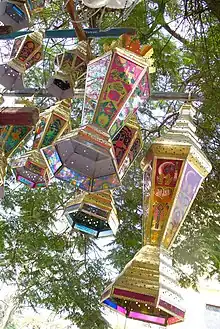
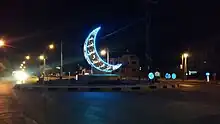
For many foreigners, a trip to any Muslim country is not complete without wandering around the chaotic bazaars while tasting local street food. However, be prepared if you are travelling to a Muslim-majority area during Islam's holiest month, Ramadan, as you might find that roads and bazaars are almost abandoned, with no refreshments whatsoever available on the street.
Ramadan (also spelled Ramadhan and Ramzan), a month-long festival, falls in the ninth month of the Islamic calendar and is the time when Muslims all around the world fast during daylight hours every day. The month definitely brings a lot of joy for Muslims, but for many non-Muslims, travelling or living in a Muslim-majority country during this time may come with some inconveniences and restraints. On the bright side, however, it offers a chance to see a different side of life in Muslim countries. It's an incredibly important, sacred and religious time for Muslims, and while many tourists do keep visiting Muslim countries throughout the year including Ramadan, some basic knowledge about this special tradition will help to make your experience a fascinating one.
Understand
The history of Ramadan dates back to the pre-Islamic period, when Arabs used to fast from the rising to the setting of the moon. In the Quran, the central holy scripture of Islam which Muslims believe was revealed by Allah (God) to the Islamic prophet Muhammad, the fast rules were made more onerous by the period being changed to the rising of the sun to its going down. Ramadan, in the ninth month of the Islamic calendar, was declared as the holy month of Islam, and fasting was made mandatory for every Muslim adult, with certain exceptions made for health and other extenuating circumstances.
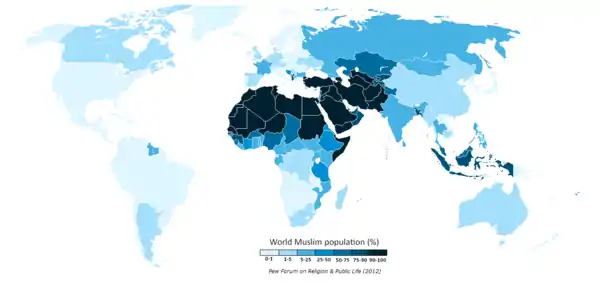
Muslims worldwide observe the month of Ramadan as a month of fasting and, therefore, travelling during Ramadan into Muslim-majority countries can pose an added challenge. Along with fasting — no eating, drinking or smoking — from dawn until sunset, Muslims also refrain from engaging in sexual relations, and especially activities that are forbidden by Islam in any month.
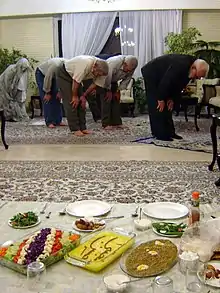
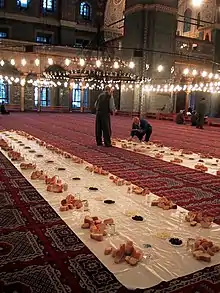
Ramadan is a time when many Muslims focus on their faith and spend much of the day in religious observances, so in that sense it is related to days of penance, fasting and reflection in other religions, such as Yom Kippur in Judaism and Lent in Christianity. Fasting during Ramadan is one of the Five Pillars of Islam, one of five basic acts which are mandatory for every Muslim.
During Ramadan, Muslims are expected to engage in extra prayers and worship of Allah, in order to learn willpower and self-control and for a kind of first hand experience of the sufferings of the poor, who rarely get to eat well. The ultimate goal is to inspire God-consciousness in Muslims around the globe. Many Muslims use this opportunity to give generously in charity (zakat), which is another one of the Five Pillars of Islam.
While Ramadan is not the easiest and most favoured time to visit a Muslim country, since daily life changes dramatically in those countries during this special month, you may have a totally different cultural experience if you do. In addition to the change in meal schedules for Muslims, businesses' opening hours often change as well, and people work only until afternoon in the majority of Muslim countries. School will take place on the usual schedule (with minor modifications for the benefit of those who observe fasting), so if you are teaching English or another subject and have Muslim students, whether in a Muslim-majority country or elsewhere, you'll want to facilitate their observance of Iftar (see below).
Get around
Travelling during Ramadan can be difficult, especially towards the end of the month when everybody tries to go back to their families for Eid and back again afterwards. Ticket prices are high, flights, buses and trains are frequently sold out and major highways often have epic traffic jams.
Suhoor and Iftar
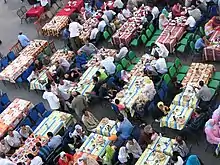
The primary practice in Ramadan is fasting from dawn to sunset (not always the local dawn and sunset, as this would be unreasonable in summer at very high latitudes), and there are two meals at either end of that period. The pre-dawn meal before the fast is called the Suhoor, or Sehri in some countries. It is consumed early in the morning before the dawn (Fajr) prayer.
Iftar is the meal that breaks the fast after the sunset (Maghrib) prayer. While Suhoor is often taken in private, Iftar is a much more social meal. Family and friends gather in homes to rejoice, and a wide variety of sweet and savory dishes and delicious desserts are prepared according to local traditions and preferences. Restaurants are busy as well and often have special dishes. Iftar parties and social gatherings are frequently arranged where people and communities gather to break fast together, and special arrangements are made daily in mosques as well, where free meals are offered to diners for them to break the fast. If you are invited for Iftar celebrations, it is good custom to bring a small gift (e.g. food) for your hosts.
Dishes for Iftar vary from one region to another, but one item that is commonly consumed around the world is dates — especially dates from Saudi Arabia, which are fantastic and well worth buying if you have a chance to do so during this month or any other.
In some Muslim countries, tour companies may be able to organise an Iftar experience with a local host for you; look around if you are interested. Charitable organizations also often set up public Iftar tents serving free meals to the poor, which you are also welcome to partake as a tourist.
Respect
There's a saying: "When in Rome, do as the Romans do"; the same goes for Muslim countries. Non-Muslims are not expected to fast or follow Islamic practices but they should be aware of the local laws and customs and should respect them. Even Muslims are not religiously bound to fast if they're travelling during Ramadan, though most do anyway.
The most difficult thing may be to abstain from eating, drinking or smoking tobacco in public areas during the daytime, usually dawn until dusk. In many Muslim-majority countries such as Saudi Arabia, it’s illegal to eat or drink in a public area during daylight during Ramadan, and this is considered a crime and prosecuted as such. Police usually patrol the streets and offenders, both Muslim and non-Muslim, can get fined. There have been incidents in Gulf countries where foreigners were even expelled from the country while Muslims were jailed. Even where it is legal you should refrain, both to avoid calling unwelcome attention to yourself and as a gesture of respect for those who are fasting.
Consider stocking your hotel room with drinks and snacks that you can consume in private. Some hotels will also continue to offer room service even when public restaurants are closed. If you are in an area where food is served for travellers even during Ramadan and where tipping is considered appropriate, tip heavily at this time. The poor staff are working — and seeing and smelling your food — even though they are fasting; they may deserve a little extra.
Avoid public physical intimacy with a person of the opposite sex, even if you are married to each other. Public displays of affection are considered rude and even forbidden by law in certain Muslim countries, and this is especially true during Ramadan. As for same-sex displays of affection, homosexuality is taboo or illegal in many Muslim areas. Even in more liberal areas, restraint may be a good idea at any time, and especially during Ramadan.
Everyone will be expected to dress more conservatively than normally, so ensure you dress modestly in public — always a good idea in Islamic areas, but particularly during the holy month of Ramadan. Uncovered arms, legs, shoulders or hair may offend others.
Try to not play loud music in public areas (including in a car) or dance during Ramadan, as it is seen as bad form.
Mosques such as those which are usually open to visitors for sightseeing and even to non Muslims in other times of the year remain closed during Ramadan in some countries whereas in some countries, special tours are usually organised during Ramadan.
Avoid chewing gum or smoking in public as well since these are also forbidden by the rules of the fast.
Survive
Think twice about travelling for business, as many businesses in Muslim countries close early and operate with a skeleton staff for the entire month of Ramadan. Furthermore, even when hours are not affected, work performance is affected by fasting. If you nevertheless need to make a business trip to a Muslim country during Ramadan, try to make your appointments as early as possible in the morning, when your counterpart is more fresh and likely to be in a good mood. During the afternoon, energy level and working performance tend to decrease, people start to get lazy and sleepy, and everyone wants to leave for home as early as possible. Keep in mind that hunger and tiredness can cause irritability, and try to be forgiving when you find people a bit cranky.
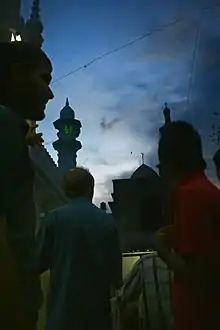
The majority of restaurants are closed during daylight in most Islamic countries, though a limited number may open to cater to non-Muslims, especially in touristy areas, or in areas with many non-Muslim locals. In some countries places keeping open may be discreet about it and best found by asking at your hotel – which might also be willing to serve you food in your room. Grabbing takeaway food from fast food chains attached to fuel stations is an option in some countries. In a few countries there really is no food available before dark even in the biggest and most touristy cities.
In some countries with lots of tourism, such as Morocco and Turkey, many facilities remain open to some extent to serve non-Muslim travellers, and in general the change in the normal routine isn't too striking at their tourist destinations.
In most countries and regions off the beaten tourist path and without large domestic non-Muslim groups, Ramadan is very strictly observed and few facilities are open. Such countries include Saudi Arabia, Iran, Pakistan and Bangladesh. The same applies to a few countries with many tourists, like the United Arab Emirates (with exceptions in Dubai).
Muslim countries with large non-Muslim populations include Lebanon, Indonesia, Malaysia (in bigger cities) and Brunei. The non-Muslims have access to facilities, but are expected to respect those observing Ramadan; dining areas might be screened or behind curtains, and at some places, you may be asked to confirm that you're not a Muslim to get access.
Often there is a strict difference between areas where non-Muslims to a large extent can ignore Ramadan and areas where they are required or supposed to mostly behave like local Muslims. Still, even where you are allowed to eat, drink and enjoy yourself as a tourist also during Ramadan, the staff serving you may be fasting.
Alcohol is banned from sale or not available at all during Ramadan in many Muslim countries. You may also find that most attractions are closed during the day throughout Ramadan, as the level of activity during daytime is decreased.
Your best course is probably to emulate the locals: take it easy during the afternoon, get out of the heat, and have a nap so you will be ready for the festive evening. If you are not Muslim, have a drink and a snack as well. People usually become "night owls" during Ramadan. Festivities begin right after Iftar — shopping areas and bazaars start getting busy and remain open past midnight hours. Streets remain vibrant until Sehoor in bigger cities, and people stay awake until Suhoor time to enjoy the feast.
Even if you don't have a friend in a Muslim country you are visiting, you can still dine with Muslims when they break their fast. Around the Muslim world, tents and tables are set out on streets and in bazaars with free food served for fasting people. Non-Muslims are always welcome too. In many areas, especially in traditional bazaars, restaurants open after the sunset prayers and do a roaring trade until well after midnight.
If you're a Muslim, even in non-Muslim countries a mosque is the best place to be for Iftar. Special arrangements are made in mosques throughout the world, let alone Muslim countries, where people are served with free meals and drinks. This gives a good opportunity to mingle with locals and taste the local food at no cost. If you're travelling into a non-Muslim country, you may also be able to find restaurants near the mosques that serve Halal food. People are usually very welcoming and friendly in evenings during the joyous time of Iftar and are happy to share free food with everyone. Many restaurants offer special Iftar buffet meal deals at lower prices and some may even provide free drinks for guests.
Packing food and carrying bottles of water are strongly recommended, because food stalls are closed during fasting and open about 2 to 3 hours before Iftar, though starred hotels and minimarts often sell foods and beverages during the day, though this varies between countries and regions. Bazaars are also open 2 to 3 hours before fasting break and many kinds of foods and drinks can be found, but mainly with (extra) sweet tastes. Avoid eating or drinking during the day in public areas. You also should not eat or drink in public transport, as fellow passengers are fasting. Even airlines in Muslim countries do not usually serve food to travellers (even non-Muslims), and even if they do, it's always best to not ask for a meal as your fellow passengers may be fasting and may not be able to control their appetite after seeing a delicious meal being eaten. Children, who are not expected to fast during Ramadan, should be freely served food and drinks as usual.
Try to avoid being on the road during Iftar time, as traffic increases while everyone rushes home to feast with family members, and the chance of accidents therefore increases. Before Iftar, streets start to become empty, and right at Iftar, huge cities can become ghost towns, as public transport in many countries comes to a brief stop for up to half an hour. 3 days before and after Eid al-Fitr is not a convenient time to be on the road, because there are many traffic jams and public transport is also extremely crowded, while rental cars are very difficult to find, and if you do find one, rates will be much higher than usual. For about a week after the end of fasting month, domestic tourists flock to tourist resorts and hotel prices increase there, but in large cities, the hotels are empty.
In some cities, drummers roam the streets well before morning, waking locals in time to prepare and have Suhoor. If you don't want to follow the Ramadan schedule yourself, make sure to pack some earplugs.
Buy
Most Muslim countries, as well as countries with long-established Muslim minorities such as India, China, Thailand and Singapore, will have large night bazaars selling halal food, as well as clothing and decorations for the upcoming Eid al-Fitr. If you are in these areas during Ramadan, these are excellent places to try some local dishes, buy ethnic souvenirs and soak up the festive atmosphere.
Eid al-Fitr
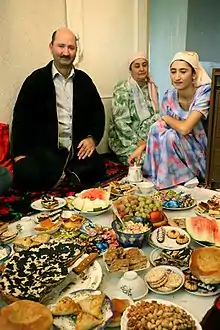
The day to celebrate the end of Ramadan is one of the most joyous holidays of the year for Muslims.
While Ramadan can be a challenging time to be in a Muslim country, Eid, which is usually celebrated for three days and goes by various names around the world, is a great time to be there, especially if you have friends who invite you to celebrate with them and share some of the wonderful food that is made especially for the holiday. Each country and region in the Muslim world has its own distinctive savory and sweet foods for Eid.
Many countries have their own greetings in the local language used during Eid, but one used everywhere is the Arabic "Eid Mubarak", which translates as Blessed Eid or Happy Eid. If you're in a Muslim country, try to widely exchange the Eid greeting during the three days of Eid. Gifts are commonly given on Eid to children, friends and relatives. Most people choose to celebrate the first day of Eid at home with family and by visiting relatives and friends, but by evening, restaurants start to get crowded. Most bazaars and markets remain closed during the three days of Eid, while most other businesses are closed for longer periods.
In Malaysia and Brunei, it is customary for the king to open the royal palace to the public once a year for Eid al-Fitr, during which you can exchange greetings with the king (for male visitors) or queen (for female visitors), and lunch cooked by the palace kitchen is served to the public.
Even in non-Muslim countries, particularly those with long-established Muslim minorities, it is often possible to enjoy some aspects of this festival. Almost any restaurant which specialises in food from some Muslim region, some Muslim ethnic minority, or in halal food (food Muslims are permitted to eat under Islamic law), can be expected to do something special for Eid and, since they are doing it largely for their own community and in a spirit of celebration, both quality and pricing tend to be very good.